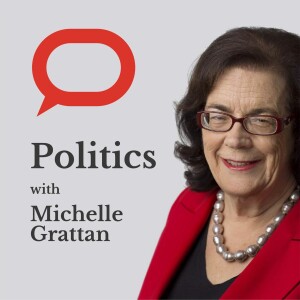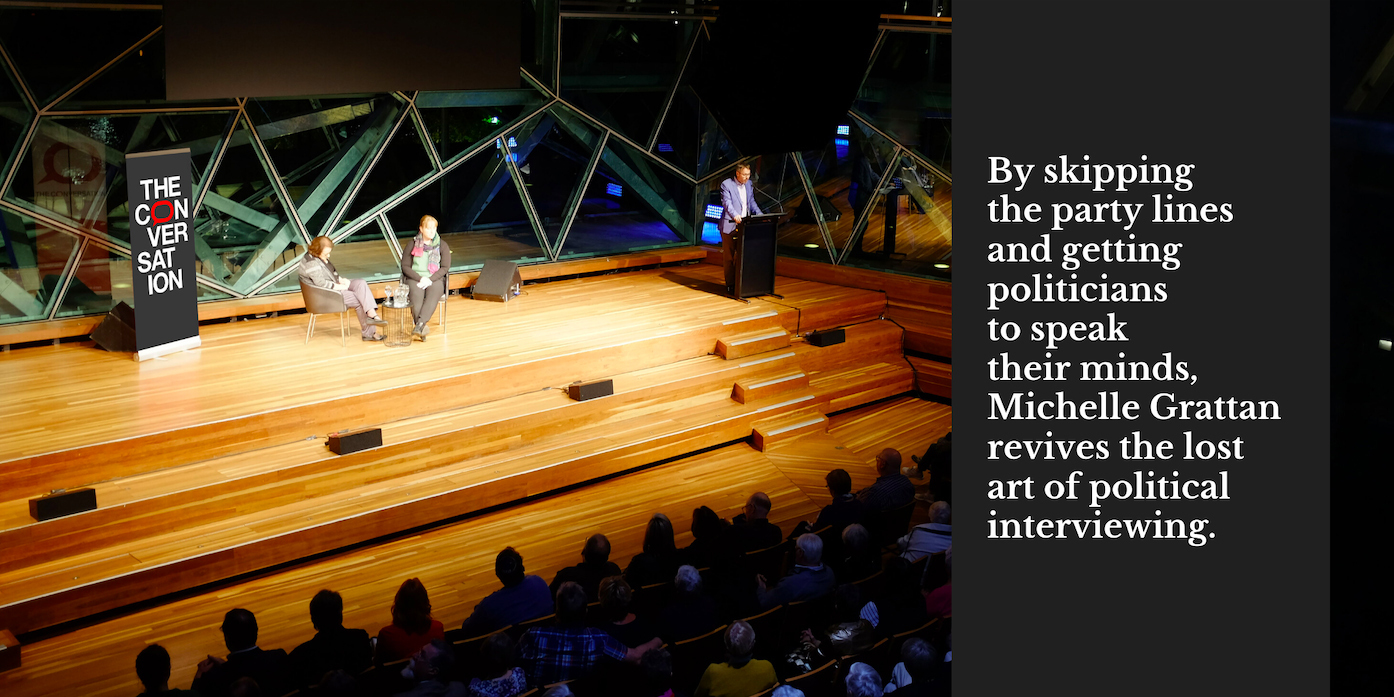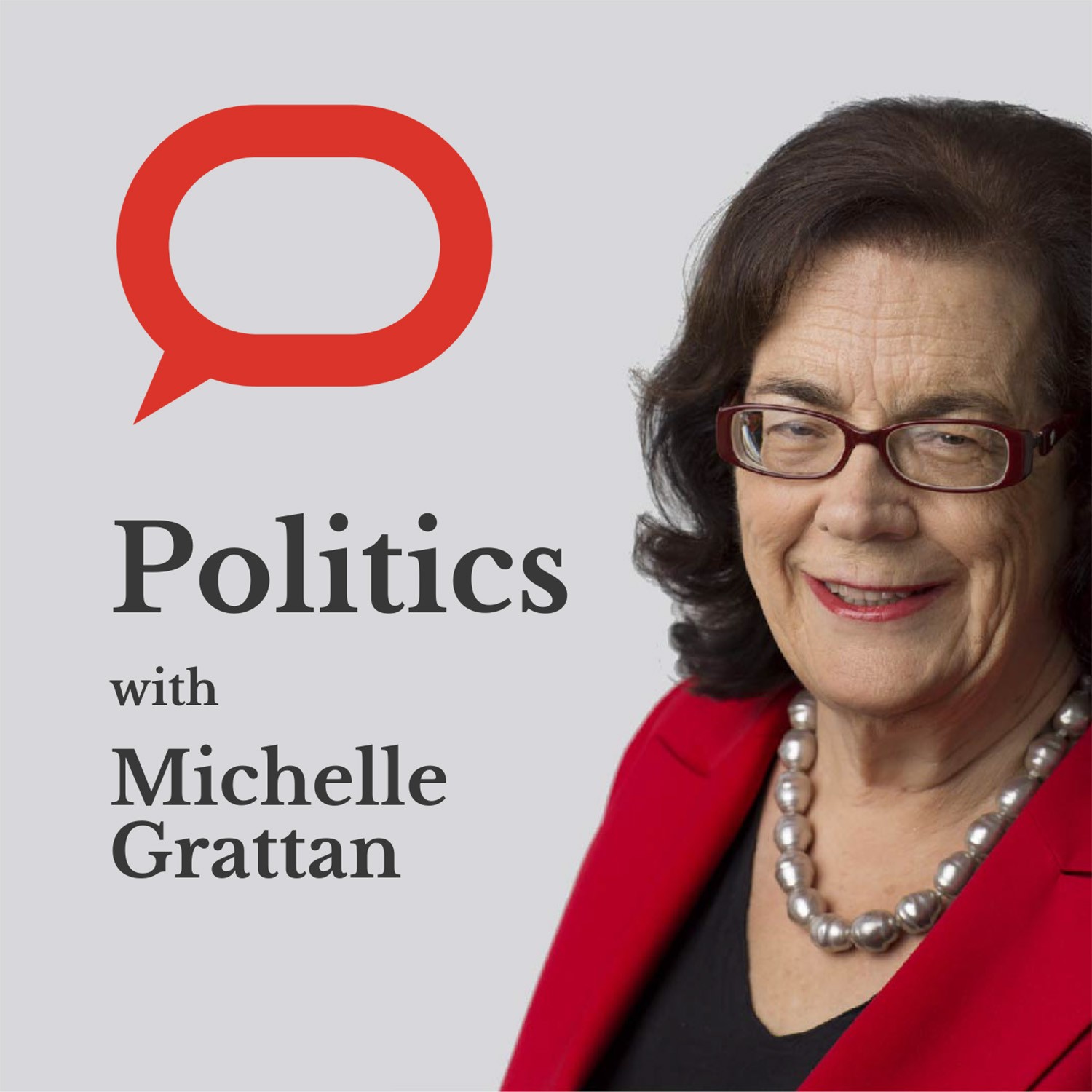Episodes

Wednesday Jul 06, 2022
Politics with Michelle Grattan: Jason Clare on Australia’s education challenges
Wednesday Jul 06, 2022
Wednesday Jul 06, 2022
New Education Minister Jason Clare is travelling the country taking soundings in the education sector.
This, he says, is “the best way to get across this big, vast portfolio that stretches from the education of our youngest children right through to the incredible work our brilliant postgraduate people are doing in our universities.
"What am I hearing? What am I learning? I get the impression that a lot of people are desperate for re-engagement with the government.”
Outlining his plans for an Australian Universities Accord, Clare says there’s a desire for the government “to work with our universities, not just our vice-chancellors, but everybody who works in our universities and harness all of the skills and expertise that sit within our universities. I don’t think we do enough of that.”
One of Clare’s main imperatives is to address equity issues. “It’s in our collective interest as a country to make sure that more people – wherever they live, whether their skin is black or white, whether their parents are rich or poor – get access to university, and when they get there that they stay there and get a qualification.”
He strongly argues that “there’s more work we need to do in helping young people get access to university.
"I’m conscious […] that all the answers don’t lie at the front door of the university. The work that we do long before someone is old enough to go to university – that’s critical here. But universities can help answer this question too. What are the things we do from the age a child is born and until they’re five, that set them up for success? Because if we narrow the gap in opportunity there, the impact will be enormous come university.”
The COVID pandemic has had a major impact on Australia’s international education program. “International education was crushed by the pandemic - when the borders shut, that shut out students.”
Australia’s international education program is “an incredible national asset, extraordinarily important for the Australian economy. Before the pandemic [it was] something like $40 billion. [It’s] now about half that. We’ve got to rebuild it. It’s important not just because of the money it makes us, but because of the goodwill that it provides for us.”
There is currently a “backlog of visa applications. International students [are] hungry to get back to study here in Australia, particularly ahead of semester two. And there’s work that we need to do there to assist in that processing task.”
One of the most pressing issues in education is the teacher shortage, which includes the challenge of retention,
“It’s about what we do to encourage people to stay being teachers. In all of the conversations I’ve had with educators, they’ve made this point to me time and time again - that people are feeling burnt out mid-career and that they’re hanging up the boots and leaving teaching. We’re expecting the shortage of teachers to get worse and worse in the years ahead. Something like 4,000 teachers short of what we need by 2025.”

Tuesday Jul 05, 2022
People’s pockets hit again, with rate rise and floods set to boost veggie prices
Tuesday Jul 05, 2022
Tuesday Jul 05, 2022
As well as her interviews with politicians and experts, Politics with Michelle Grattan includes “Word from The Hill”, where she discusses the news with members of The Conversation politics team.
Michelle and Peter Browne from the Politics + Society team discuss Anthony Albanese's visit to Ukraine, and the desirability of Australia reopening its embassy there as soon as it can. More generally, Australia's diplomatic presence has slipped and needs to be beefed up.
With the PM now home, he's off to the flood affected areas of NSW. Labor has learned from the former government's experience, and has acted quickly to get in resources, seeking to avoid the criticism Scott Morrison faced in the earlier floods.
Meanwhile the Reserve Bank has again increased interest rates, with the cash rate rising by half a percentage point. Also hitting people's pockets – the latest floods will have some impact on fresh food prices.

Wednesday Jun 29, 2022
Parliamentary ‘newbies’ inspect their workplace, with some complaints
Wednesday Jun 29, 2022
Wednesday Jun 29, 2022
As well as her interviews with politicians and experts, Politics with Michelle Grattan includes “Word from The Hill”, where she discusses the news with members of The Conversation politics team.
Michelle and Peter Browne from the Politics + Society team discuss Anthony Albanese’s weighing a Ukraine visit and whether Australia will announce more support for that country and reopen its embassy there.
They also canvass the just-released Lowy Institute’s poll, which found a narrow majority of Australians support increased defence spending, and Defence Minister Richard Marles’ announcement extending the terms of the military’s top brass.
Meanwhile Parliament House has been like the first week of school, with new MPs being briefed on how the place works. Crossbenchers are in a row with the government over Albanese’s plan to cut back the additional staff they will get, above the entitlement of government and opposition backbenchers, from four in the last parliament to just one.

Thursday Jun 23, 2022
Greg Barns on the battle to free Julian Assange
Thursday Jun 23, 2022
Thursday Jun 23, 2022
Julian Assange, the founder of WikiLeaks, is facing extradition to the United States after this was given the green light by the British Government. Assange faces charges of espionage over the publication of classified information about US actions in the Iraq War.
Barrister Greg Barns has worked pro bono on Assagne’s case for the last nine years as part of the Australian Assange campaign.
Barns argues the Assange issue “goes to fundamental questions like freedom of the press and freedom of speech.”
The election of the Albanese government has reignited calls for Australia to do more to try to bring Assange home.
“We’ve certainly been heartened by the approach taken by the new government,” Barns says.
“I think Anthony Albanese himself has been committed for some time now in his public statements and certainly been supportive privately of Assange’s position. He’s made that clear in a number of statements with a theme really that this has gone long enough.”
“There has been a marked change in rhetoric on the part of Mr Albanese, but also I think in his very telling statement that he did not want to pursue this matter through megaphone diplomacy, which we respect, because of course you’re dealing with Australia’s closest ally.”
“He wants to do something, but he wants to do it in a way that respects the friendship between Australia and the United States.”
On what US President Joe Biden should consider when it comes to the relationship with Australia and the issue of Assange, Barns notes Biden has “given a number of speeches now talking about democracy and the importance of democratic values”.
“This is an opportunity to assert those values by saying that freedom of speech and freedom of the press are fundamentally important in a democracy and in the democratic world. And so there are certainly plenty of avenues and plenty of reasons why President Biden might deal with this matter.”
“This case has gone on too long. There are fundamental principles at stake and it’s time to end it.”

Tuesday Jun 21, 2022
On the economy, people smugglers, parliamentary sitting, and Julian Assange
Tuesday Jun 21, 2022
Tuesday Jun 21, 2022
As well as her interviews with politicians and experts, Politics with Michelle Grattan includes “Word from The Hill”, where she discusses the news with members of The Conversation politics team.
Politics editor Amanda Dunn and Michelle discuss Reserve Bank Governor Philip Lowe’s Tuesday statements about the economic outlook. Lowe has again warned of more rate rises, indicating the bank is determined to reduce inflation from a likely 7% at year’s end down to the 2-3% target range. But the Governor says he doesn’t expect Australia to face a recession.
Meanwhile Home Affairs Minister Clare O'Neil has visited Sri Lanka this week amid concerns the people smugglers are looking to test Australia’s borders now there’s a new government. Australia, which needs Sri Lanka to be as active as possible in stopping boats leaving, has announced $50 million in aid for that country, directed to its food and health needs.
With Wikileaks founder Julian Assange facing extradition from Britain to the United States, Anthony Albanese is under pressure to make strong representations to have the Australian freed. Albanese is sympathetic, but whether he can achieve any progress is another matter.
The calendar for the new parliament has now been released, showing only four sitting weeks between now and the October budget.

Friday Jun 17, 2022
Tony Wood on the unprecedented energy crisis
Friday Jun 17, 2022
Friday Jun 17, 2022
As the energy crisis continues to grip Australia’s east coast with consumers told to limit their consumption and warnings of blackouts Tony Wood, director of the energy program at the Grattan Institute, speaks with Michelle Grattan about why this has happened and what can be done to fix the system.
The crisis is unprecedented, Wood says. “We’ve certainly seen situations where things have got very tight[…] But this sort of extended period when we’ve had major power outages and real stress on the entire system for such a long time has never been seen before.”
He says the crisis could have been minimised if past governments had worked to “address climate change” and “bring on more renewables” as well as all the technology to support a renewables industry.
That being said, Wood points out there are other factors also driving the crisis.
“We still would have had the weather patterns we had in the south, on the east coast of Australia, that caused all the rain and caused all the flooding of the coal mines that interrupted power supply. And of course, we wouldn’t have prevented the Ukraine war and we probably would have had real stress on the gas supply system.”
Wood argues that “things became very complicated very quickly”, as the crisis developed.
On whether the crisis is in part a result of power companies playing the system, he says: “I don’t honestly think the companies were trying to game the system, but I think the commercial arrangements were so complicated [that the Australian Energy Market Operator taking over the system] was the only solution.”
Some have suggested the crisis has been worsened because many assets have been privatised. Wood disagrees. “I don’t think this is a fundamental failure of privatisation […] I do think it’s a fundamental physical problem and government ownership wouldn’t have made much difference.”
“Transitions are always difficult things […] I think we can see where we’re going. It’s got to be a system which is overwhelmingly dominated by renewable energy.”
“In the short term, we are going to manage this transition carefully, which means as we adopt more and more renewables, we’re going to need some of these coal-fired power stations and gas-fired power stations to maintain the stability and the reliability of the system. They should only be there as necessary to support that transition.”
“I have no doubt we can move to net zero by 2050. But remember, it will be net zero. It won’t be absolute zero. And of course, the sooner we start really seriously creating momentum in that direction, the more likely we are to get there and the more likely it is we’ll get there without too much cost.”

Tuesday Jun 14, 2022
Bowen says “bumpy” time ahead for power supply – but don’t turn the heater off
Tuesday Jun 14, 2022
Tuesday Jun 14, 2022
As well as her interviews with politicians and experts, Politics with Michelle Grattan includes “Word from The Hill”, where she discusses the news with members of The Conversation politics team.
This week Michelle and politics editor Amanda Dunn discuss the apparent early signs of a thaw in China’s attitude towards Australia. But Anthony Albanese has responded by saying China needs to do something tangible – removing trade restrictions it has imposed on Australia.
On the domestic front, Energy Minister Chris Bowen warns of a “bumpy” time ahead for power supplies but says you should keep the heater on (just switch off outside lights if they’re not needed).
Amanda and Michelle also canvass the people smugglers testing the new government on border protection, and Friday’s national cabinet meeting where premiers will be pressing the federal government for more funds for their struggling health systems.

Tuesday Jun 07, 2022
Warm smiles in Indonesia, but chillier news
Tuesday Jun 07, 2022
Tuesday Jun 07, 2022
As well as her interviews with politicians and experts, Politics with Michelle Grattan includes “Word from The Hill”, where she discusses the news with members of The Conversation politics team.
While Anthony Albanese this week continued to receive a warm reception abroad, at home the new government faced more difficult news. In this podcast Michelle and politics + society editor Amanda Dunn canvass Tuesday’s 50 basis points rise in interest rates – the latest cost of living blow for many families – and Albanese’s trip to deepen Australia’s relationship with Indonesia. They also take a look at the new shadow ministry, announced by Peter Dutton and David Littleproud on Sunday.

Thursday Jun 02, 2022
Tony Burke advocates on wages and arts
Thursday Jun 02, 2022
Thursday Jun 02, 2022
Tony Burke is the minister for employment and workplace relations and minister for the arts, as well as the leader of the House of Representatives.
One of his first tasks is the government's new submission for the minimum wage case, which will say these workers should not be left behind, as inflation has spiked.
If the Fair Work Commission gives a 5.1% rise, in line with inflation, is there a case for it not flowing through to awards, or all awards?
"I can't imagine a situation where there was no flow-through at all. The commission always has the capacity to work out how the flow-through might happen." He notes one option floated has been a flat dollar increase so the flow-through happened differently.
"The commission will work that through. But certainly there are many awards that are not far from the minimum wage.
"And when we talk about the heroes of the pandemic a lot of those people are on those awards. So while the focus has been specifically minimum wage, I tend to use the term low-paid workers."
On reforming parliament, Burke says he is not trying to get rid of the anger. He doesn't want to turn parliament into "a quiet, polite dinner party".
"The debate is fierce and passionate and real. I think that matters and I think it's good for democracy."
Nor is he in favour of scrapping "dorothy dixers", because the government needs the opportunity to tell the house what it is doing.
But there will be more questions for the larger crossbench, and he flags the government won't so routinely shut down opposition moves for debates.
"Standing Orders say there's one question from the crossbench. With a crossbench as large as what we're now facing, that's just not sustainable."
Without changing that, "you're effectively telling a very large number of Australians that because they didn't vote for a major party, their voice is going to be heard less."
Burke says he has a passion for the arts – he was briefly arts minister at the end of the last Labor government – and laments a lack of a cultural policy in recent years.
"In cultural terms, what the arts, events, entertainment sector do matters to who we are as Australians. And that affects your education policy, your health policy, your trade policy, your foreign affairs policy. Nor has there been any guidance that these are serious industries and these are serious jobs."
The arts are really important in giving people a capacity to imagine and create, Burke says. They are "really important for us as a nation. I don't think we've had an arts minister see it as a priority in that sense for a long time, and I really want to bring that back".

Wednesday Jun 01, 2022
Word from The Hill: Albanese’s ministry mixes stability and surprise
Wednesday Jun 01, 2022
Wednesday Jun 01, 2022
As well as her interviews with politicians and experts, Politics with Michelle Grattan includes “Word from The Hill”, where she discusses the news with members of The Conversation politics team.
In this podcast Michelle and politics + society editor Amanda Dunn canvass Anthony Albanese’s ministry, with its record number of women in cabinet but one woman, Tanya Plibersek, having her portfolio unexpectedly switched.
Peter Dutton, on being elevated to Liberal leader, flagged he’d pitch to the suburbs and small business. Meanwhile the Nationals showed that holding all the party’s seats (and winning an extra one) doesn’t guarantee the leader keeps his job. Barnaby Joyce was dispatched, in favour of the rather less flamboyant David Littleproud, to the relief of many Liberals.
Meanwhile, Anthony Albanese will be off to Indonesia next week, in his second overseas trip since winning office.

